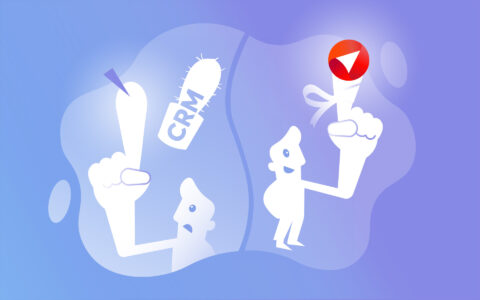A high-tech, digital-themed image showing a network of connected devices (like computers, mobile devices, and servers) with a CRM system at the center. Symbolize the integration of CRM software into the modern digital business landscape.

For business growth and success, the right tools have never been more vital. As CRM software emerges as a cornerstone of modern business, a pressing question arises: Should you craft your own custom solution, or lean on the expertise of a reliable ready-built option?
As we traverse the financial nuances of developing bespoke CRM software for 2023 and 2024, remember that navigating the digital landscape also involves making informed choices.
Together, we'll explore this important decision, discovering the answer to the question: How much does it cost to build a CRM system? We will also weigh the pros and cons for a smarter, more productive and efficient business future.
Factors Influencing CRM Development Costs
The cost of custom CRM software hinges on multiple variables, ranging from the complexity of desired features to the scalability requirements. It's essential to dissect these factors to comprehend how they impact the overall expenditure.
A comprehensive analysis of CRM software costs encompasses not only the development team's expenses but also factors in technology investments, licensing, and ongoing maintenance, shedding light on the broader financial landscape.
Cost Ranges for CRM Software in 2023/24
Developing a custom CRM can come with its set of financial intricacies. Drawing from some data provided, here's a detailed breakdown of potential expenditures when considering such an undertaking.
Small Business Custom CRM
- Time: Generally shorter than extensive projects, spanning a few weeks to a couple of months.
- Budget: Approximately $20,000
- Good to know: Modules in this CRM included a scheduling component, an online payment system, an automated SMS and email system, client history generation, and a human resources manager.
Standard Custom CRM Development:
- Time: Typically spans several months, but the exact duration varies based on features and complexity.
- Budget: Around $110,000
- Good to know: Calculated on an average developer hourly rate of $35-40. It's vital to remember that if one chooses developers from regions like the U.S. or Western Europe, costs might inflate by 1.5-2 times due to their higher hourly rates (typically around $70-100).
Complex CRM Development Cost:
- Time: Can be a lengthy process of many months
- Budget: Up to $690,000
- Good to know: Complex CRM systems demand substantial development effort, often requiring specialized teams and extended timelines. These intricate solutions, which can include advanced integrations, automation, and data analytics, significantly influence the overall development cost.
How to Create CRM Software With Reduced Costs
- Global Outsourcing: Tapping into global talent pools can drastically decrease CRM development expenses. Several countries are renowned for their IT expertise but have a lower cost structure. Engaging developers from these countries can yield high-quality results at a fraction of the price. It's important to note that many of these developers possess strong English communication skills, ensuring smooth collaboration.
- Rigorous Scrutiny of Developer Portfolios: Being cost-conscious doesn't mean compromising quality. When shortlisting potential development firms, closely examine their portfolios. Delve into their past CRM projects to gauge their expertise, timeliness, and user feedback. Such a study will give a clearer picture of the company's reliability and proficiency.
- Embark with an MVP: Adopting a phased development approach with a Minimum Viable Product can prove economical. It means launching a CRM system with essential features and then progressively adding advanced functionalities. This approach not only manages initial costs but also allows for refining features based on real-world feedback.
- Reuse and Recycle Existing Tools: Instead of building everything from scratch, consider integrating existing tools and software that serve some of your CRM's desired functions. This can save both time and money.
- Prioritize Open Source Technologies: Opting for open-source platforms or tools can trim down licensing costs. These platforms are usually community-driven and have robust security and feature enhancements.
- Continuous Feedback Loop: Involve end-users early and often in the development process. Regular feedback can help identify potential problems or unnecessary features before they become costly mistakes.
- Clear Scope and Documentation: Before embarking on the development, clearly outline the project's scope and document every requirement. This prevents scope creep, which can lead to increased costs and development time.
Pros of Developing Custom-Built CRM Systems
Pro - Precision in Meeting Unique Requirements: A custom CRM provides the luxury of fine-tuning to your specific business needs. Every feature and functionality is crafted with intention, ensuring an alignment that off-the-shelf solutions may not offer.
This customization grants businesses the flexibility and control to design a system that mirrors their operational structure and goals.
Pro - Amplified Efficiency Leading to Elevated Productivity: Custom-built CRMs aren’t just about tailoring to needs, they're about enhancing work efficiency. By automating routine tasks and processes, these systems dramatically reduce manual efforts. The ripple effect of this is palpable – leading to a surge in team productivity and an enhancement in the quality of customer service.
Pro - Scalability Synced with Business Growth: One of the standout merits of a custom CRM is its adaptability. As your business evolves, the system can too. Whether it's adding a new feature, expanding existing capabilities, or scaling operations, a custom CRM is built for the future, ensuring you're never hemmed in by the constraints typical of pre-packaged solutions.
Pro - Crafting a Competitive Edge: In a saturated market, differentiation is key. A custom CRM lets you introduce innovative features and processes that your competitors might lack. This not only provides better service to your clients but places you several strides ahead in the competitive race.
Pro - Uncompromised Data Security & Compliance: With rising concerns about data breaches and stringent regulations, having control over your CRM's security is paramount. Custom solutions empower you to set rigorous security standards, ensuring that every piece of sensitive customer information is safeguarded.
Additionally, you can ensure adherence to all relevant industry and regional regulations, giving you peace of mind.
Pro - Seamless System Integration: While every business operates on a CRM, they also juggle several other tools and platforms. A custom CRM is like a well-designed puzzle piece – it can fit perfectly within your existing tech ecosystem. Whether it's integrating with an ERP system, a marketing automation tool, or an e-commerce platform, custom CRMs can be designed to weave into your business operations effortlessly.
Cons of Developing a Custom CRM System
Con - Significant Upfront Financial Investment: While a custom CRM offers tailored features, it comes with a heftier price tag. This initial expenditure is significantly higher than most ready-to-use CRM solutions available in the market, which offer immediate functionality at a fraction of the cost.
Con - Extended Time to Market: Crafting a CRM to cater to your bespoke needs isn't a swift process. It demands careful planning, design, and development, which means your business might have to wait longer to reap the benefits of the system, potentially causing a lapse in operational efficiency in the interim.
Con - Recurring Maintenance Obligations: Beyond the initial build, a custom CRM necessitates ongoing attention. From periodic updates to addressing unexpected bugs and providing consistent user support, these tasks not only demand time but also result in cumulative costs over the system's lifecycle.
Con - Need for Specialized Talent: A custom CRM is not a 'set and forget' system. It requires consistent oversight by professionals with specialized knowledge. Whether it's in-house talent or external consultants, recruiting, training, and retaining such expertise is both time-consuming and often costly.
Con - The Complexity Conundrum: In the quest to create a 'perfect' system, there's always the danger of overcomplicating things. Over-engineering can lead to a bloated CRM, brimming with features that, while impressive, may remain untouched. This not only increases costs but can also make the system less user-friendly.
Con - Restricted Access to Third-party Innovations: One of the advantages of popular off-the-shelf CRM solutions is their extensive ecosystem filled with third-party plugins and integrations. Custom CRMs, on the other hand, might lack this expansive ecosystem, limiting the potential to extend functionalities through external integrations.
Con - Reliance on Original Developers: A custom solution, while tailored, can inadvertently tether you to its creators. If modifications or troubleshooting are required down the line, you might find yourself overly reliant on the original development team, which could be problematic if they are unavailable or if contractual terms change.
What are the key benefits of using eWay-CRM?
While there are myriad CRM options in the market, there are a number of important reasons to favor ready-made solutions like, eWay-CRM, over custom-built alternatives. Here's why opting for eWay-CRM can simplify your business operations.
The Ease and Efficiency of eWay-CRM:
- Quick Implementation: Ready-made solutions like eWay-CRM are designed for rapid deployment, allowing businesses to benefit from its features immediately, as opposed to the lengthy development time custom solutions require.
- User-Friendly Interface: eWay-CRM is built with user experience in mind. Its interface mirrors the familiar platform of Microsoft Outlook, as it integrates seamlessly with it. This reduces the learning curve and accelerates team adoption.
- Proven Performance: eWay-CRM has undergone rigorous testing and refinement based on user feedback. This ensures that businesses are utilizing a reliable and optimized tool.
- Cost-Effective: Building a custom CRM can be expensive, both in development costs and potential troubleshooting. eWay-CRM's scalable pricing structure, including a solid free version, offers a cost-effective solution for businesses of all sizes.
- Regular Updates: With eWay-CRM, you benefit from regular updates and improvements, ensuring the software stays current with evolving business needs without additional development expenses.
- Integrated Features: eWay-CRM offers a suite of integrated tools, from email synchronization to project management. This cohesive approach eliminates the need to juggle multiple software solutions.
- Dedicated Support: The eWay-CRM team is on standby to assist with any queries, challenges, or training needs, ensuring seamless operation and maximizing the software's benefits.
- Security Assurance: eWay-CRM prioritizes data protection with built-in security features, giving businesses peace of mind without the headache of customizing security protocols.
- Flexible Customizability: While eWay-CRM is a ready-made solution, it doesn't skimp on customization. Users can tailor features to their unique needs, ensuring a fit-for-purpose tool without the challenges of building from scratch.
In essence, while custom-built tools might seem tempting, the simplicity, efficiency, and reliability offered by ready-made solutions like eWay-CRM make them a compelling choice.
By opting for a ready-built CRM like eWay-CRM, businesses can spend less time grappling with software development and more time leveraging the tool's benefits to achieve their goals.
Navigating CRM System Creation in 2023 and 2024
As we approach the nexus of 2023 and 2024, understanding how to design a CRM system is more than just an operational concern—it's an investment in the future. The financial landscape of custom CRM development requires meticulous attention to both cost dynamics and overarching business goals.
However, leaning towards ready-made solutions like eWay-CRM can often alleviate many typical challenges, offering streamlined, user-friendly platforms that cater to most organizational needs without the intricacies of custom development.
Choosing to forge ahead with a custom CRM hinges not just on current needs, but also on long-term visions. Balancing the scales between benefits and challenges, any organization stepping into this domain should prioritize a blend of strategic foresight and informed decision-making.











